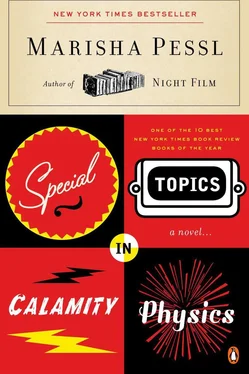Jade nodded knowingly at my silence. “We’ll have to do something about it then,” she said, sighing.
After this painful revelation, on Friday nights, after I got clearance from Dad to spend the night at her house (“And this Jade individual — she’s one of your Joycean aficionados?”), Jade, Leulah and I, decked out in Jefferson’s Studio 54 prom getup, drove an hour to a roadside bar in Redville, just over the South Carolina border.
It was called the Blind Horse Saloon (or lin ors loon, as the sign whispered in dying pink neon), a grouchy place Jade claimed the five of them had been frequenting for “years,” which, from the outside looked like a burnt loaf of pound cake (rectangular, black, no windows) stranded in an expanse of stale-cookie pavement. Armed with farcically fake IDs (I was brown-eyed Roxanne Kaye Loomis, twenty-two, five-feet-seven, a Virgo organ donor; I attended Clemson with a major in Chemical Engineering; “Always say you’re seriously into engineering,” Jade instructed. “People don’t know what it is and they won’t ask because it sounds mind-numbing.”), we edged past the bouncer, a large black man who stared at us as if we were cast members of Disney on Ice who’d forgotten to remove our costumes. Inside, the place was stuffed with country music and middle-aged men in plaid shirts clutching their beers like handrails. Most of them stared openmouthed at four televisions suspended from the ceiling broadcasting some baseball game or local news. Women, standing in tight circles, fiddled with their hair as they talked, as if putting finishing touches on a sagging flower arrangement. They always glared at us, particularly Jade (see “Snarling Coon Dogs,” Appalachian Living , Hester, 1974, p. 32).
“Now we find Blue’s lucky man,” Jade announced, her eyes creeping all over the room, past the linebacker jukebox, the bartender pouring shots with a strange brawny energy, as if he were a GI who’d just arrived in Saigon, and the wooden benches along the far wall where girls waited with foreheads so hot and oily you could fry eggs on them.
“I don’t see any melted Milk Duds,” I said.
“Maybe you should hold out for true love,” Leulah said. “Or Milton.”
It was a running joke between Jade and Lu that I “had it bad for Black,” that I desperately wanted to be “Black and Blue,” make “the beast with two Blacks,” and so on — allegations I refused to admit to (even though they were true).
“Haven’t you heard the expression ‘Don’t shit where you eat?’” Jade said. “God, you people have no faith. There. The cute one at the end of the bar talking to that malaria mosquito. He’s wearing tortoiseshell glasses. Know what tortoiseshell glasses mean?”
“No,” I said.
“Stop pulling down your dress, it makes you look five. It means he’s intellectual. You can never be too far in the backwoods if someone at the bar’s wearing tortoiseshell glasses. He’s perfect for you. I’m parched.”
“Me too,” I said.
“I’ll go,” said Leulah. “What do you want?”
“We didn’t drive all the way to this shantytown to purchase our own beverages,” said Jade. “Blue? My cigarettes please.”
I took them out of my purse and handed them to her.
Jade’s pack of Marlboro Lights was the instrument ( boleadoras ) she used to ambush unsuspecting men ( cimarron ). (Jade’s best subject — the only one at which she excelled — was Spanish.) She began by roaming the bar ( estancias ), singling out an attractive, beefy guy standing a little apart from everyone else ( vaca perdida , or lost cow). She approached him slowly and with no sudden jerks of the head or hands, tapped him lightly on the shoulder.
“Got a light, hombre ?”
There were two inevitable scenarios this opening evoked:
1. He eagerly obliged.
2. If he didn’t have a light, he started a frantic quest to find one.
“Steve, got a light? Arnie, you? Henshaw? A light. Matches okay too. McMundy, you? Cig — know if Marcie has one? Go ask — right. Does Jeff? No? I’ll go ask the bartender.”
Unfortunately, if the outcome was #2, by the time the cimarron returned with fire, Jade was already on the lookout for more lost cattle. He’d stand motionlessly at her back for a minute, sometimes up to five or ten minutes, not doing anything but chewing his lower lip and staring straight ahead, occasionally mooing a dreary “Excuse me?” at her back or shoulder.
Eventually, she acknowledged him.
“Hmm? Oh, gracias, chiquito. ”
If she was feeling at home on the range, she tossed him two questions:
1. Where do you see yourself in, say, twenty years, cavron?
2. What’s your favorite position?
Most of the time he was unable to answer either off the top of his head, but even if he answered #2 without hesitation, if he said, “Assistant Manager of Sales and Marketing at Axel Corp, where I work and I’m months away from a promotion,” Jade had no choice but to butcher him and cook him immediately over an open fire (the asado ).
“Unfortunately we have nothing else to talk about. Beat it, muchacho. ”
Most of the time he didn’t react, only stared at her with drippy, red eyes.
“Vamos!” she shouted. Biting our lips in suppressed laughter, Leulah and I raced after her, hacking our way across the room ( pampas), fertile with elbows, shoulders, big hair and beer cups, all the way to GIRLS. Jade elbowed past the dozen muchachas standing in line, telling them I was pregnant and about to be sick.
“Bullshit!”
“If she’s pregnant how come she’s so scrawny?”
“And why’s she drinkin’? Don’t alcohol cause preemies?”
“Oh, stop hurting your cerebrums, putas, ” said Jade.
We took turns laughing and peeing in the handicapped stall.
Sometimes, if the lighting of Jade’s cigarette was done with swift precision, she began to have a real conversation, though it was usually so loud, most of it consisted of Jade firing off more questions and the guy mooing, “Huh?” over and over as if trapped in a Beckett play.
Occasionally, the guy had a friend who rested his heavy load of a gaze on Leulah, and once, a man with apparent color blindness and more hair than an Old English Sheepdog fixed his gaze on me. Jade nodded excitedly and pulled her own earlobe (her sign for “This is the one”), but when the guy bent his bushy head down to inquire how I was “likin’ Leisure City,” for some reason I couldn’t think of anything to say. (“‘Fine’ is mind-numbing. Never ever say, ‘fine,’ Retch. And, another thing. Granted, he’s hot as hell, but if you bring up your dad in conversation one more time, I’ll cut out your tongue.”) After too long a pause I said, “Not much.”
Frankly, I was a little terrified of how he leaned over me, so confident of his beer breath and his chin, which, underneath the masses of hair, appeared to be modeled after a sugar cone, how his eyes looked down my front as if he’d like nothing better than to lift my hood and inspect my carburetor. “Not much” wasn’t the answer he was looking for, because he forced a smile and set about trying to raise Leulah’s hood.
There were times too, when I’d glance back to the spot by the door where Jade, minutes before, had been inspecting her Angus bull, trying to decide if he was worth buying to improve her herd — and she wasn’t there. She wasn’t any where, not by the jukebox, or by the girl showing another girl her gold necklace—“He got me this, innit sweet?” (it looked like a gilded thumbnail) — not in the breath-dampened hallway that led to the back by the couches and pinball machines, not by the man fossilized at the bar mesmerized by closed captions (“A tragedy coming out of Burns County this evening with a robbery that left three dead. Cherry Jeffries is live at the scene.”). The first time it happened, I was terrified (I’d read The Girl Done Gone [1982] by Eileen Crown when I was too young and thus it’d made a gruesome impression) and immediately, I alerted Leulah (who, though she looked prim and old-fashioned, could turn pretty vixeny with her nosegay smile, the way she coiled her thick braid around her hand and spoke in a little-girl voice so men tilted over her like big beach umbrellas trying to block the sun).
Читать дальше












